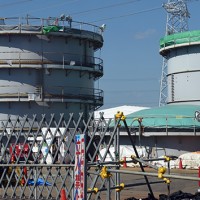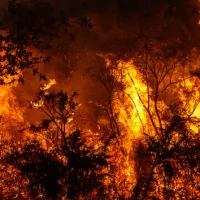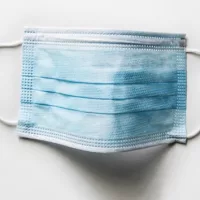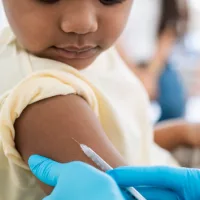
 TOSHIFUMI KITAMURA/AFP/Getty Images(FUKUSHIMA, Japan) — A worker at Japan’s Fukushima Daiichi nuclear plant has been diagnosed with leukemia, but experts say a sharp increase in cancer related to the plant is unlikely.
TOSHIFUMI KITAMURA/AFP/Getty Images(FUKUSHIMA, Japan) — A worker at Japan’s Fukushima Daiichi nuclear plant has been diagnosed with leukemia, but experts say a sharp increase in cancer related to the plant is unlikely.
In March 2010 a massive earthquake and tsunami damaged the Fukushima Daiichi plant, causing a meltdown of three reactors and forcing the evacuation of workers and local residents. When the meltdown was eventually contained, there was a 12-mile evacuation zone around the plant. More than 80,000 people left their homes due to the threat of radiation.
Emails to Tepco, the company that ran the Fukushima plant, were not immediately answered.
Dr. James O’Donnell, division chief of nuclear medicine at University Hospitals Case Medical Center in Cleveland, Ohio, said the worker’s exposure to radiation slightly increased his risk for cancer but “it’s a big, big leap” to connect his cancer to the the Fukushima incident.
“There might be a four to five percent” increase in cancer risk for most Fukushima employees,” O’Donnell told ABC News. “[If there’s] no radiation you’d expect 10 to 15 people for every 100,000 [to get leukemia]. A four percent increase means 11 to 16 workers out of 100,000 [may develop cancer.]”
O’Donnell said exposure to radiation is more commonly associated with thyroid cancer. Recent studies of children in the Fukushima area have found higher levels of thyroid cancer but experts including O’Donnell are unsure if that is related to more testing or an increase in actual cases.
“It’s been pretty well agreed upon that [the lag time between exposure and disease diagnosis] is really fuzzy,” O’Donnell said of diagnosing cancers related to radiation exposure. “People most at risk are children or children in utero….we will need to monitor them for their entire lifetimes.”
Studies on the radiation released at Fukushima by the World Health Organization and United Nations have indicated that there will not be a major outbreak of cancer in adults who were directly affected by the Fukushima meltdown.
“A breakdown of data, based on age, gender and proximity to the nuclear plant, does show a higher cancer risk for those located in the most contaminated parts. Outside these parts – even in locations inside Fukushima Prefecture – no observable increases in cancer incidence are expected,” Dr. Maria Neira, WHO director for public health and environment, said in a 2013 statement.
A 2013 report from the United Nations Scientific Committee on the Effects of Atomic Radiation found that cancer rates for those working in the plant immediately after the meltdown were unlikely to be elevated.
“No discernible increase in cancer in this group is expected, because its magnitude would be small in comparison with normal statistical fluctuations in cancer incidence for such a small group,” the report said.
The committee did note that it was vital to follow those exposed to understand more about the effects of radiation exposure.
Copyright © 2015, ABC Radio. All rights reserved.















